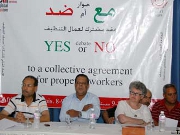MENU
Affiliates only
Login
Login

Following the "Arab Spring" in Tunisia, trade unionists were able to secure agreement from the government that public sector cleaning services will not be subcontracted to the private sector. This was an important step in stopping the "race to the bottom" for workers in the cleaning industry. What this has not answered, however, is the need for private sector cleaners to also have the ability to improve their wages, hours and working conditions through collective bargaining.
Cleaners are amongst the most underpaid workers in almost every country. They work in difficult environments with undesirable work hours. They are often ignored or mistreated and they are paid very little. The average private sector cleaner in Tunis earns barely 150 dinars (75 Euros) a month. Collective bargaining, which gives workers a voice on the job, is the best way to ensure that these workers have a chance for a decent life.
UNI Property Services met with union members and leaders from FGPS and UGTT to discuss innovative and successful organising and bargaining strategies for cleaners in the SEIU (USA) "Justice for Janitors" Campaign and the FNV Bondgenoten (Holland) "Schoon Genoeg!" Campaign (translated this means "Clean Enough" and also "Enough is Enough"). Both SEIU and FNV Bondgenoten have had huge success in organising workers in the cleaning sector and because of this, both unions have been able to raise workers' wages and benefits and to improve the working conditions for their union members.
UNI Property Services will hold its Steering Committee meeting in Tunis on September 23, 2011 and a leadership conference on September 24, 2011, and meet with the Minister of Social Affairs on September 26, in support of the cleaners' campaign in FGPS to gain a collective agreement in private sector cleaning.